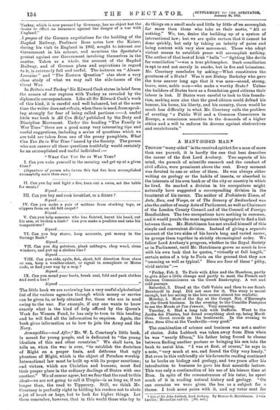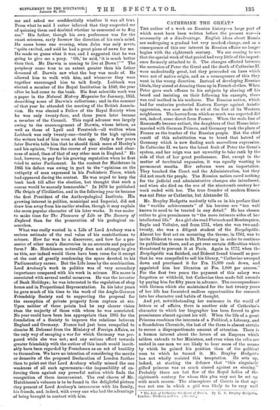A MANY-SIDED MAN.* THOUGH" many-sided" is the received epithet for
a man of more than one pursuit, it is hardly the one that best describes the career of the first Lord A rebury. Two aspects of his mind, the pursuit of scientific research and the conduct of civil affairs, were prominent above the rest. Every moment was devoted to one or other of them. He was always either writing on geology or the habits of insects, or absorbed in the interests of his own bank or of the city or country in which he lived. So marked a division in his occupations might naturally have suggested a corresponding division in the treatment of his career. The author of Prehistoric Times, of Ants, Bees, and Wasps, or of The Scenery of Switzerland was also the author of many Acts of Parliament, as well as Chairman of the London County Council and of the Council of Foreign Bondholders. The two occupations have nothing in common, and it would puzzle the most ingenious biographer to find a link between them. Mr. Hutchinson has not availed himself of this simple and convenient division. Instead of giving a separate account of the two sides of his hero's long and varied career, he groups them together in strictly chronological order. We follow Lord Avebury's progress, whether in the Royal Society or in Parliament, until Mr. Hutchinson grows so much in love with his own task that he quotes, "virtually at fall length," certain notes of a trip to Paris on the ground that they are "amusing as well as typical." Here are four of these " pithy, vivid entries "Friday, Feb. 2, To Paris with Alice and the Hatnbros, partly to give Alice a little change and partly to meet the French and German Commissioners on the Greek Bankruptcy. A wet and cold passage. Saturday, a Dined at the Cafd Voisin and then to see Sarah Bernhardt in key/ Did not care for it. The story is moral enough, but her acting in the love scenes almost too realistic, Monday, e. Most of the day at the Compt. Nat. d'Escompte on the Greek business. In the evening to the Comedic, Francais° to see the Monde on ran s'ennnie. Very amusing.
Tuesday, & Had a long talk with Dufferin. Wont to the Jardin des Plantes, but found everything shut up, being Mardi Gras. Great crowds on the boulevards. In the evening to Mete. Sans ague at the Vaudeville—very good."
The combination of science and business was not a matter of choice. John Lubbock was taken away front Eton when he was "nearly fifteen," his father being forced to choose between finding another partner or bringing his son into the bank to assist him. "I was at first, of course," he says in a note, " very much at sea, and found the City very lonely." But even in this unfriendly air his favourite reading continued to be books on biology and geology, and two years after his introduction to business he gave his first scientific lecture. This was only a continuation of his use of his leisure time at Eton. In spite of the remonstrances of his tutor, he spent much of it in reading natural history and geology. "On one occasion we were given the bee as a subject for N theme. I took some pains with it, and my tutor sent for • Life of Sir John Lubbock, Lord clesbury. By Horace O. Hutchinson. Ssots. London: hisemilloo nod Co. 00s. netd
me and asked me confidentially whether it was all trus. From what he said I rather inferred that they suspected me of quizzing them and doubted whether to commend or to flog me." His father, though his own preference was for the -exact sciences, early foresaw the direction of his eon's mind. He came home one evening, when John was only seven. "quite excited, and said he had a great piece of news for me. He made ne guess what it was, and I suggested that he was going to give me a pony. ' Oh,' he said, ' it is much better
than that. Mr. Darwin is coming to live at Down ! ' The prophecy came true to an extent greater than his father dreamed of. Darwin saw what the boy was made of. He allowed him to walk with him, and whenever they were together encouraged Lim to talk freely. Lubbock was elected a member of the Royal Institution in 1849, the year -after he had come to the hank. His first scientific work was a paper in the Natural History Magazine for January, 1853, describing some of Darwin's collections ; and in the summer of that year he attended the meeting of the British Associa- tion. He was elected a Fellow of the Royal Society when he was only twenty-four, and three years later became a member of the Council. This rapid advance was largely owing to the encouragement of Darwin, whose letters, as well as those of Lyell and Prestwich—all written when Lubbock was only twenty-one—testify to the high opinion the writers had of him even at that age. Only a few years later Darwin tells him that he should think more of Huxley's and his opinion, "from the course of your studies and clear. mess of mind, than of that of any other man in England." Ho had, however, to pay for his growing reputation when he first tried to enter Parliament. In the contest for Maidstone in 1885 his defeat was owing in part to the " opinions on the antiquity of man expressed in his Prehistoric Times, which had appeared during the contest. He was urged to keep the -book back till after the election, but thought that such a course would be scarcely honourable." In 1870 he published The Origin of Civilisation, and in the following year he became the first President of the Anthropological Institute. His growing interest in politica, municipal and Imperial, did not draw him away from his earlier studies, though it may explain the more popular character of his later works. It was easier to make time for Tin Pleasures of Life or The Scenery of England than for the prosecution of his geological re- searches.
What wan really wanted in a Life of Lord Avebury was a serious estimate of the real value of his contributions to science. How far was he a discoverer, and how far a pre- senter of other men's discoveries in an accurate and popular form P Mr. Hutchinson naturally does not attempt to give us this, nor indeed would there have been room for it except at the cost of greatly condensing the apace devoted to his Parliamentary career. But the Life loses by the combination. Lord Avebury's work in politics was of very secondary importance compared with his work in science. His name is associated with several useful measures. He was the inventor of Bank Holidays; he was interested in the regulation of shop hours and in Proportional Representation. In his later years he gave much of his time to the work of the Anglo-German Friendship Society and to supporting the proposal for the exemption of private property from capture at sea. Upon neither of these points had he any clearer vision than the majority of those with whom he was associated. No year could have been less appropriate than 1905 for the foundation of a Society to improve the relations between England and Germany. France had just been compelled to dismiss M. Delcasse from the Ministry of Foreign Affairs, as the only way of escaping a war for which Germany was pre- pared while she was not ; and any serious effort towards greater friendship with the author of this insult would inevit- ably have been regarded by Frenchmen as an act of hostility to themselves. We have no intention of considering the merits or demerits of the proposed Declaration of London further than to point out that Lord Avebury wholly missed the one weakness of all such agreements—the impossibility of en- forcing them against any powerful nation which finds the recognition of them inconvenient. The real charm of Mr. Hutchinson's volumes is to be found in the delightful picture they present of Lord Avebury'a intercourse with his family, his friends, and, indeed, with every one who had the advantage of being brought in contact with him:



















































 Previous page
Previous page